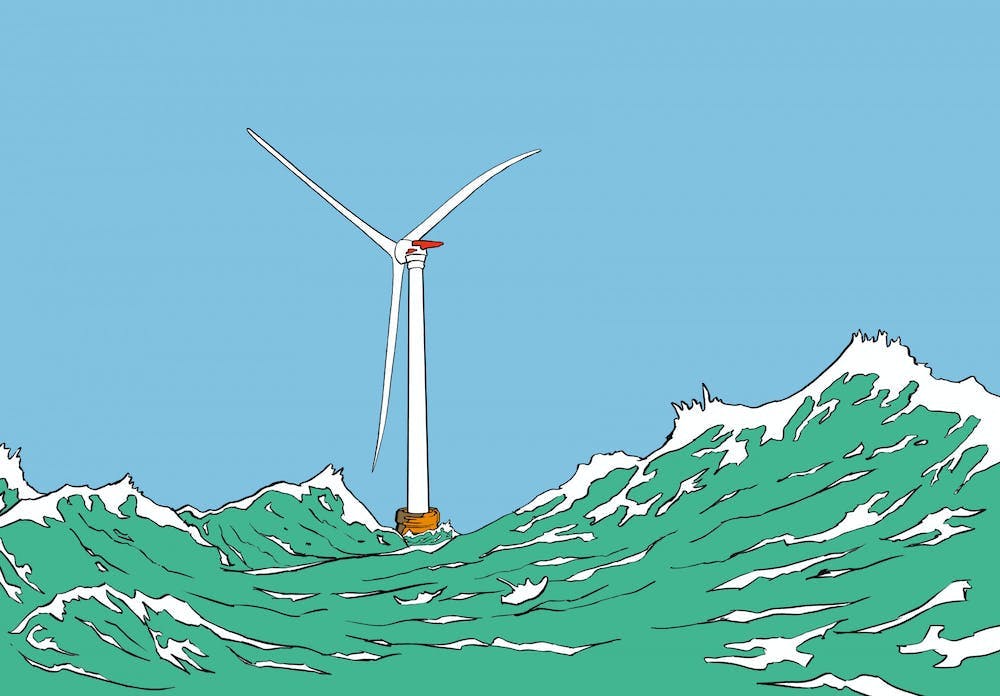By all indications, offshore wind will power the Ocean State’s energy transition.
Rhode Island is home to the Block Island Wind Farm, the United States’s first offshore wind farm. Last fall, Gov. Dan McKee announced a request for proposal for 600 to 1,000 megawatts of offshore wind — enough to meet “at least 30 percent of Rhode Island’s estimated 2030 electricity demand.”
Combined with a third project expected to be operational by 2025, the Revolution Wind project, Rhode Island is on pace to power half of the state’s energy needs with offshore wind — helping the state limit emissions, according to a press release from McKee’s office.But despite its emission-reducing impacts, the project could come at the cost of the safety of fishing vessels, said Fred Mattera, executive director of the Commercial Fisheries Center of Rhode Island.
Rhode Island fishers like Mattera are concerned about the impact of Revolution Wind, set to be located 15 miles south of the Rhode Island coast, and other offshore wind projects on their ability to navigate and continue fishing in their usual waters. The Herald spoke with stakeholders to understand the relationship between offshore wind and the fishing industry.
Meanwhile, Revolution Wind entered its fourth stay agreement with the Rhode Island Coastal Resources Management Council on Tuesday to extend the project’s review timeline.
The extension serves in part to allow further consideration of a draft environmental impact statement, Laura Dwyer, a public educator and information coordinator for the Rhode Island Coastal Resources Management Council, told EcoRI News.
Dwyer wrote in an email to The Herald that the CRMC also entered the new stay agreement to have more time to review all facets of Revolution Wind’s application and for negotiations to continue between Orsted, one of the farm’s operators, and the Fishermen’s Advisory Board, a group of fishers advising the state on coastal development created under the Ocean Special Area Management Plan.
Currently, the CRMC is set to review the project during an April 11 meeting, with the review timeline set to conclude April 28.
Navigation and safety
Mattera emphasized that the project’s proposed one nautical mile-by-one nautical mile transit lanes are insufficient for larger commercial vessels. “That may seem like a big distance, but when you put several boats together, trust me, it's not a lot," he said. According to Mattera, fishermen have requested transit lanes of four nautical miles, but aside from their inclusion as a potential alternative in the environmental impact statement, no progress has occurred on this request.
Mattera, who operates a trawler built to drag nets along the seafloor to snare fish, described the following scenario: rain, high-speed winds, tall waves, limited visibility — and the looming presence of wind turbines several hundred feet tall that require navigating past in order to return to shore.
Safety is a key concern for fishers regarding offshore wind projects, Mattera said. Boulders unearthed by the construction process could snag nets or other equipment, and weather conditions could pose real risks to fishermen in the presence of wind farms, which could prevent safe navigation to shore, he said. Mattera also added that an increasing number of wind turbines can hinder the efficacy of radar technology.
According to a representative from Revolution Wind, the one nautical mile-by-one nautical mile spacing is the widest among any existing offshore wind farms, and the federal lease area in which the project will reside minimizes impact to both the habitat and fishers.
The representative added that Revolution Wind will fund a “Navigational Safety Fund that will help commercial and charter fishing vessels upgrade radar and safety equipment.” The equipment and training will be supplied by local companies.
Mixed opinions on wind farm impacts
Talya ten Brink, a research associate for the University of Rhode Island’s Department of Marine Affairs, said that the reported impact of wind farms on fishers is mixed.
Ten Brink conducted a study published in 2018 that investigated both commercial and recreational fishers’ perceptions of the impacts of R.I.'s Block Island Wind Farm.
The conclusions of the study noted that fishers expressed various concerns, including navigational hazards, losing access to the area during construction and losing both fishing ground and gear. But the study also found different opinions between commercial and recreational fishermen.
Several fishers, particularly recreational, felt that the turbines attracted fish. “They felt that the wind farm functioned as a destination or target and served as an artificial reef, especially for spearfishing,” ten Brink said. Commercial fishermen shared that they thought the increase in recreational fishing "crowded (them) out," she added.
Small recreational boats “can maneuver and get around (the turbines), and they don't have to go and make a big living at it like the rest of us,” Mattera said.
According to ten Brink, many factors can impact fishers' experience with wind farms. “Every situation is different,” she said.
Environmental impacts
Revolution Wind promises 704 megawatts of power, 400 of which will go to Rhode Island’s grid. The farm will be co-operated by New England energy company Eversource and Orsted, based out of Denmark.
That power could help Rhode Island meet its emission reduction targets of 35% by 2030 and 80% by 2040, as spelled out in the 2021 Act on Climate.
“Climate change is an existential threat to the biodiversity of the natural world, and one of the best ways to protect that biodiversity is the development of clean energy,” wrote Revolution Wind’s representative.
“I understand green energy. I have children and grandkids, and I certainly want to reduce the carbon footprint,” Mattera said. But he added that he also is concerned about the fragility of ocean ecosystems.
“My concern is that we don't know enough about the ocean,” he said. “If you want to do these things, put them on land.”
Dwyer did not respond to specific claims about the effect of the project on marine ecosystems.
A 2014 study in Environmental Research Letters on the general impacts of offshore wind on marine habitats showed a consistent negative impact during the construction phase, but mixed impacts during the “operational phase” that depend on “local environmental conditions.” Another study in Nature showed that “offshore wind farm developments can have a substantial impact on the structuring of coastal marine ecosystems.”
In an email to The Herald, Dwyer emphasized the importance of reaching a compromise between developers and commercial fishermen — part of the rationale behind the extension.
“This is the venue through which the fishing community can discuss its concerns with projects and everything associated with them, and the CRMC considers those concerns when reviewing wind projects,” she wrote.





